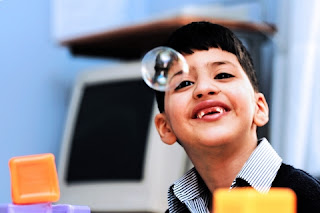There are lots of frightening rumors about what causes this mysterious
brain disorder in children. We asked leading experts across the country
for the very latest news.
Facts Every Parent Should Know
Nancy
Wiseman had a feeling early on that something wasn't quite right with
her daughter. When Sarah was 6 months old, she stopped babbling, and by
10 months, she was silent. By 18 months, the increasingly aloof toddler
no longer responded to her name, and she resisted being held, kissed, or
touched. "I felt that I was losing my child a little more each day,"
says Wiseman, of Merrimac, Massachusetts. When Sarah wasn't saying any
words or even making sounds that resembled words by 20 months, her
grandmother, a school psychologist, suspected that the girl might
actually be deaf. Instead, Wiseman was devastated to learn that her
daughter had autism. "The diagnosis really knocked the wind out of me,"
she recalls, "but I was relieved to finally know what was wrong."
Although
the severity of autism can vary widely, many children with the
neurological disorder -- which typically appears in the first three
years of life -- have problems speaking, interacting with others,
sharing affection, and learning. Thanks to the tireless efforts of
parents and advocates, public awareness of autism has grown tremendously
since it was first identified in 1943, but it is gaining even more
attention today than ever before. Congress has held hearings on the
condition. Public-health agencies are spending millions to study it.
Researchers at countless universities are racing to find the causes and
best treatments.

"There are many unanswered questions," says
Alice Kau, Ph.D., an autism expert at the National Institutes of Health,
which funded more than $74 million in autism research in 2002, as
compared with only $22 million in 1997. Still, researchers are beginning
to make progress in unraveling this baffling disorder, and the number
of resources available for families is increasing. Here, six facts about
autism that every parent should know
1. RATES ARE ON THE RISE
Autism
is ten times more common today than it was in the 1980s, according to
the Centers for Disease Control and Prevention. An estimated 1 in 88
children (11.3 per 1,000) in this country have autism to some degree. In
California, the number of kids with autism in the state's
social-services program nearly doubled between 1998 and 2002, surpassing
cases of childhood cancer, juvenile diabetes, and Down syndrome.
Nationwide, autism strikes three to four times more boys than girls; the
rates are about the same for kids of all races.
Although there
seems to be an autism epidemic, most experts attribute the increasing
prevalence to improved diagnosis and reporting. The definition of autism
has been expanded in the past decade to include a wider spectrum of
problems with communication and social interaction. "Ten years ago, many
children with mild autism were simply not diagnosed," says Adrian
Sandler, M.D., a developmental-behavioral pediatrician at Mission
Children's Hospital, in Asheville, North Carolina, and chair of the
American Academy of Pediatrics' committee on children with disabilities.
Plus, there are more state and federal programs for autistic kids,
giving doctors an incentive to diagnose and refer them. However, there
may be additional, unknown reasons for the spike in autism rates, and
researchers are investigating everything from environmental toxins to
viruses to food allergies.
2. KIDS ARE GETTING DIAGNOSED SOONER
There's
no laboratory or medical test for detecting autism, so doctors must
rely on behavioral signs. In the past, many were reluctant to label a
child as autistic until symptoms became obvious. "The average age for
diagnosis had been about 3 1/2, with many children diagnosed much
later," says Amy Wetherby, Ph.D., director of the Center for Autism and
Related Disabilities at Florida State University, in Tallahassee. But
that's changing.
One reason is that pediatricians are becoming
more aware of autism. At the same time, autism specialists are better at
identifying early telltale signs such as a lack of babbling or
pointing. "Most children with autism will show some signs of
developmental disruption by their first birthday," says Rebecca Landa,
Ph.D., an autism researcher at Baltimore's Kennedy Krieger Institute.
And
while no one is yet diagnosing autism in children that young, doctors
can now make a reliable assessment by 24 months -- when a child's brain
is still rapidly developing. "If we can intervene while a child's brain
is very immature, it will be much easier to help change her behavior,"
Dr. Wetherby says.
3. AUTISM IS A GENETIC DISORDER
Although
autism was once believed to be the result of improper parenting,
researchers now believe that genes -- not psychological factors -- are
to blame. If a couple has one autistic child, there is a 5 to 10 percent
chance that siblings will have some sort of autistic disorder. With
identical twins, the likelihood is 60 percent. Even though profoundly
autistic people rarely have children, researchers often find that a
relative has mild autistic symptoms or a high-functioning
autistic-spectrum disorder known as Asperger's syndrome.
Experts
believe that autism is the result of multiple genes -- anywhere from
three to 20 -- interacting with each other. This may explain why the
symptoms and severity of the disorder vary greatly. These genes may
cause a baby's brain to develop abnormally in utero or make him more
susceptible to unknown triggers. "There is probably a combination of
genetic and environmental influences," says Catherine Lord, Ph.D.,
director of the Center for Autism and Communication Disorders at the
University of Michigan, in Ann Arbor. Although the genes linked to
autism have not yet been pinpointed, intense research is under way.











